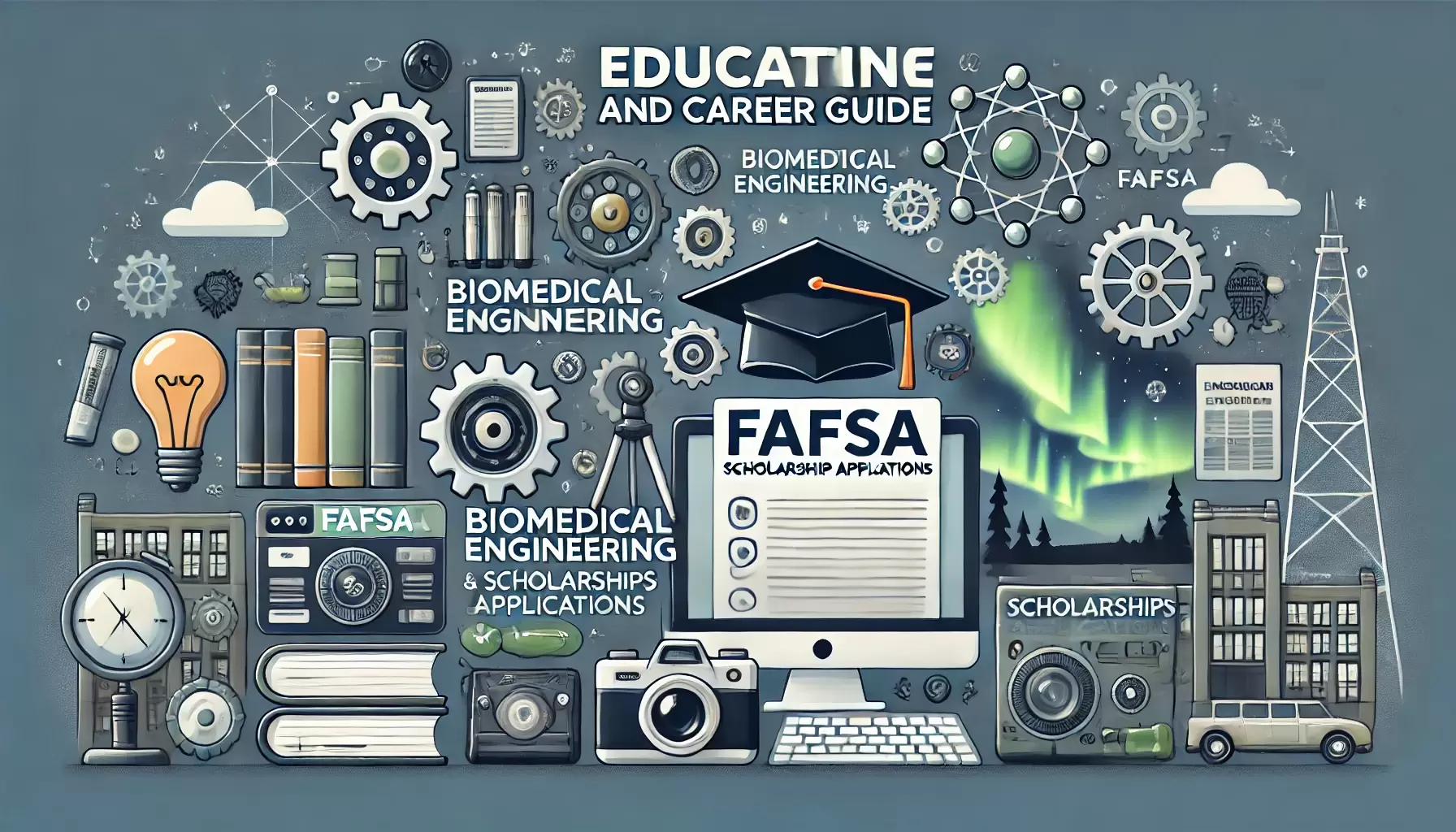Pursuing higher education is a significant life decision, and choosing the right path requires thoughtful consideration. From degrees like an online master’s in engineering management to specialized fields such as biomedical engineering, understanding your options can lead to fulfilling careers. Along the way, it’s crucial to know about financial aid, scholarships, and other resources, including Title IX education rights, which promote fair access to education. This article covers several essential topics, from applying for scholarships to understanding the differences between engineering and engineering technology, all while offering insights into other unique endeavors like photographing the northern lights.
What is Biomedical Engineering?
Biomedical engineering is a multidisciplinary field that blends engineering principles with biological and medical sciences to design and create equipment, devices, computer systems, and software used in healthcare. Biomedical engineers play a crucial role in advancing medical technology, developing life-saving devices such as artificial organs, pacemakers, prosthetics, and medical imaging systems. They also work on creating better diagnostic tools and rehabilitation equipment.
The History of Biomedical Engineering
Biomedical engineering has roots going back to ancient civilizations when early forms of prosthetics were used. However, the modern field emerged in the 20th century, particularly during World War II when innovations in prosthetics and rehabilitation were necessary for wounded soldiers. Over the last century, advancements like the development of MRI machines, CT scanners, and robotic surgery systems have revolutionized the field.
Today, biomedical engineering continues to evolve, with bioinformatics, tissue engineering, and nanotechnology pushing the boundaries of what’s possible in medicine. It offers a promising career path for those interested in making a real-world impact on human health.
What is the Difference Between Engineering and Engineering Technology?
Many students exploring engineering may encounter two related but distinct fields: engineering and engineering technology. Although they sound similar, they offer different career paths.
Engineering
Engineering is a theoretical and design-focused discipline that emphasizes developing new systems, tools, and technologies. Engineers typically engage in complex problem-solving, using mathematics and scientific principles to create designs that can be scaled and manufactured. Engineering graduates often work in roles such as design engineers, research engineers, or systems engineers, and many go on to advanced positions in management or academia.
Engineering Technology
On the other hand, engineering technology focuses more on the practical application of engineering principles. Engineering technologists work closely with engineers, but their role is more implementation-based, ensuring that designs and systems work in real-world scenarios. They often deal with hands-on tasks, including testing equipment, performing system maintenance, and managing technical operations.
The primary difference lies in the focus: engineering is about developing new ideas, while engineering technology is about applying those ideas effectively in everyday use.
Pursuing an Online Master’s in Engineering Management
For professionals in engineering fields looking to advance their careers, an online master's in engineering management is an ideal choice. This degree combines technical engineering expertise with leadership and management skills, preparing students to oversee engineering projects and teams.
The Importance of Engineering Management
As technology grows increasingly complex, companies need leaders who understand both the technical aspects of engineering and the organizational challenges of managing teams. Engineering managers often act as a bridge between business executives and technical staff, ensuring that projects align with company goals, timelines, and budgets.
Advantages of an Online Degree
One of the main advantages of pursuing an online master’s in engineering management is flexibility. Many working professionals cannot afford to take time off to attend traditional on-campus programs. Online programs allow students to work at their own pace, often balancing their education with a full-time job.
Historically, the need for engineering managers has risen as industries like aerospace, electronics, and software development have become more sophisticated. The global demand for engineering managers is expected to grow in the coming decades, offering lucrative career prospects.
Title IX Education Resources
Title IX is a federal law enacted in 1972 as part of the Education Amendments. It prohibits discrimination based on sex in any educational program or activity that receives federal funding. Title IX has played a crucial role in ensuring equal opportunities for both men and women in education, particularly in athletics, STEM fields, and higher education.
How Title IX Impacts Students
Title IX has far-reaching implications. It ensures that students of all genders have equal access to educational resources and activities, including scholarships, internships, and extracurricular programs. It also addresses issues like sexual harassment and assault, mandating that schools have procedures in place for handling complaints.
Many schools offer Title IX education resources to help students understand their rights and how to report discrimination. These resources are essential for maintaining fair and equitable learning environments.
How to Apply for Scholarships?
One of the biggest concerns for students pursuing higher education is affordability. Scholarships can significantly reduce the financial burden, making it easier to attend college or university without accumulating large amounts of debt. But how do you apply for scholarships?
Steps to Apply for Scholarships
- Research: Begin by researching scholarships early—ideally, a year before you plan to attend school. Use online databases like Fastweb or Scholarship.com, and check with the schools you’re interested in to see what they offer.
- Understand the Requirements: Each scholarship will have its own set of requirements, which might include academic achievements, extracurricular involvement, community service, or personal essays. Make sure you meet the eligibility criteria before applying.
- Gather Documents: Most scholarships require various documents, such as transcripts, recommendation letters, and personal statements. Have these ready ahead of time to avoid last-minute stress.
- Apply Early: Many scholarships have early deadlines, so it’s important to submit applications as soon as possible. Some are awarded on a rolling basis, meaning funds may run out if you apply too late.
Applying for scholarships can be competitive, but careful planning and research can increase your chances of success.
When is the FAFSA Deadline?
The Free Application for Federal Student Aid (FAFSA) is essential for students seeking financial aid in the United States. It determines your eligibility for federal grants, loans, and work-study programs. Additionally, many states and colleges use FAFSA information to offer their own financial aid.
FAFSA Deadlines
The FAFSA form becomes available every year on October 1st for the following academic year. The federal deadline for submitting the FAFSA is typically June 30th of the school year for which you’re applying. However, many states and institutions have their own earlier deadlines for grant money, so it’s essential to check with your state and school for specific dates.
Filing the FAFSA as early as possible ensures that you receive the maximum amount of aid. Certain grants and scholarships are awarded on a first-come, first-served basis, so early applicants have a better chance of securing financial assistance.
Photographing the Northern Lights: A Unique Adventure
Shifting away from academics for a moment, let's explore a different kind of experience—photographing the northern lights. Also known as the aurora borealis, the northern lights are one of the most stunning natural phenomena. Capturing this ethereal light show can be a rewarding yet challenging task for photographers.
Best Locations for Viewing
The best places to view the northern lights are in high-latitude regions like Alaska, Norway, Iceland, and northern Canada. The lights are most visible during the winter months when the nights are longer and the skies clearer.
Tips for Photographing the Northern Lights
- Use a Tripod: Stability is crucial when photographing the northern lights. Since exposures are long, a tripod will help you avoid blurry photos.
- Manual Settings: Set your camera to manual mode, and use a wide aperture (f/2.8 or lower) to let in more light. Start with an ISO of 1600 and adjust according to the brightness of the lights.
- Long Exposure: The aurora is constantly shifting, so experiment with exposure times of 10 to 30 seconds to capture the movement and color of the lights.
Historical Significance
The northern lights have fascinated humans for centuries. In ancient times, many cultures believed the lights were spirits or omens. Today, we understand them as charged particles from the sun interacting with Earth's magnetic field, creating a beautiful and otherworldly display.
In summary, education and career advancement can take many forms, from pursuing degrees like an online master’s in engineering management to exploring new scientific fields like biomedical engineering. Along the way, it’s essential to understand resources like Title IX and FAFSA, as well as opportunities like scholarships that make education more accessible. And for those looking to balance academic endeavors with life experiences, photographing natural wonders like the northern lights adds a unique and unforgettable adventure to life’s journey.
Search Terms:
Online Masters In Engineering Management
What Is Biomedical Engineering?
Title Ix Education Resources
Photographing Northern Lights
How To Apply For Scholarships?
When Is The Fafsa Deadline?
What Is The Difference Between Engineering And Engineering Technology?





